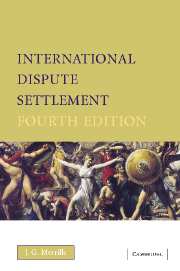Book contents
- Frontmatter
- Contents
- Preface
- Table of cases
- Table of treaties and agreements
- List of abbreviations
- List of websites
- 1 Negotiation
- 2 Mediation
- 3 Inquiry
- 4 Conciliation
- 5 Arbitration
- 6 The International Court I: Organisation and procedure
- 7 The International Court II: The work of the Court
- 8 The Law of the Sea Convention
- 9 International trade disputes
- 10 The United Nations
- 11 Regional organisations
- 12 Trends and prospects
- Appendices
- Index
1 - Negotiation
- Frontmatter
- Contents
- Preface
- Table of cases
- Table of treaties and agreements
- List of abbreviations
- List of websites
- 1 Negotiation
- 2 Mediation
- 3 Inquiry
- 4 Conciliation
- 5 Arbitration
- 6 The International Court I: Organisation and procedure
- 7 The International Court II: The work of the Court
- 8 The Law of the Sea Convention
- 9 International trade disputes
- 10 The United Nations
- 11 Regional organisations
- 12 Trends and prospects
- Appendices
- Index
Summary
A dispute may be defined as a specific disagreement concerning a matter of fact, law or policy in which a claim or assertion of one party is met with refusal, counter-claim or denial by another. In the broadest sense, an international dispute can be said to exist whenever such a disagreement involves governments, institutions, juristic persons (corporations) or private individuals in different parts of the world. However, the disputes with which the present work is primarily concerned are those in which the parties are two or more of the nearly 200 or so sovereign states into which the world is currently divided.
Disputes are an inevitable part of international relations, just as disputes between individuals are inevitable in domestic relations. Like individuals, states often want the same thing in a situation where there is not enough of it to go round. Moreover, just as people can disagree about the way to use a river, a piece of land or a sum of money, states frequently want to do different things, but their claims are incompatible. Admittedly, one side may change its position, extra resources may be found, or on looking further into the issue it may turn out that everyone can be satisfied after all. But no one imagines that these possibilities can eliminate all domestic disputes and they certainly cannot be relied on internationally.
- Type
- Chapter
- Information
- International Dispute Settlement , pp. 1 - 27Publisher: Cambridge University PressPrint publication year: 2005



